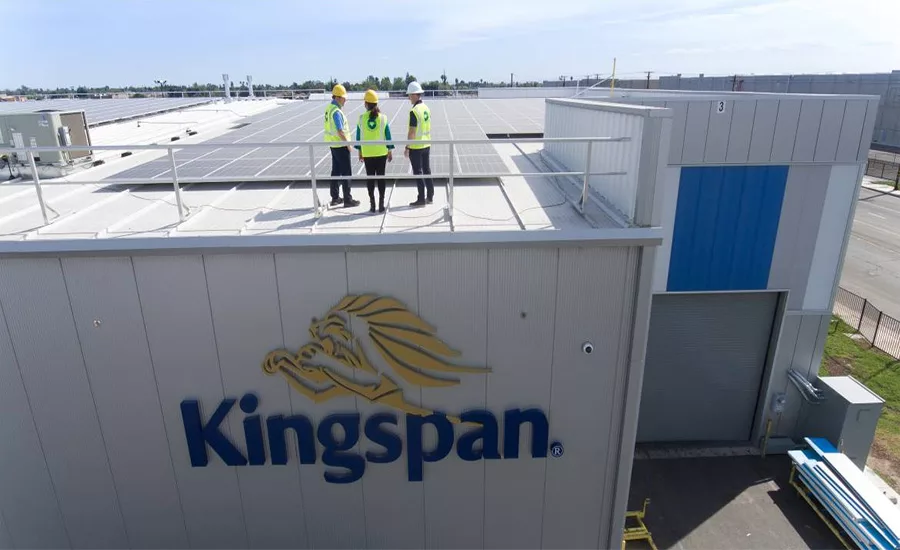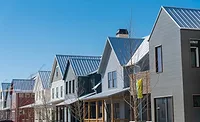Market Maker
Kingspan Flirts with Disrupting the U.S. Shingle Market
Irish building materials firm weighs move into asphalt shingle production as part of $1B U.S. roofing expansion

Kingspan’s future 100-acre Oklahoma roofing campus is being considered as the future site for asphalt shingle production as the company expands its U.S. footprint.
— Image courtesy of Building Enclosure
Kingspan Group plc is set to deepen its foothold in the U.S. roofing industry, flirting with the idea of moving into residential asphalt shingle production in a bid to capture a share of the $24-billion North American residential roofing market.
The Irish building materials company announced on June 5 that it plans to increase its U.S. roofing investment by $250 million, lifting its total commitment to $1 billion over the next five years, according to Dublin-based Goodbody Stockbrokers.
A company spokesperson said Kingspan is “closely exploring an entry to the shingles category to be potentially based at our hundred‑acre roofing campus in Oklahoma,” where the facility is described as “the largest in the U.S., centrally located.”
Kingspan’s existing “roofing mega-site” campuses in Maryland and Oklahoma, currently slated to begin production of non-residential roofing and waterproofing solutions in 2026, are expected to provide logistical synergies for shingle manufacturing.
Plans for U.S. Shingle Production
While Kingspan has not officially designated a separate shingle plant, company executives have suggested that its Oklahoma roofing campus — covering approximately 100 acres — could accommodate the new shingle line.
Goodbody analysts highlighted in a Thursday news alert that combining shingle production with Kingspan’s existing non-residential roofing and insulation operations could optimize logistics and enhance cross-selling opportunities for insulation products alongside shingles.
According to Kingspan’s announcement on Thursday, both the Maryland and Oklahoma plants will be operational by 2026 for nonresidential roofing, and the additional $250 million will fund equipment, site preparation and hiring for a shingle category “potentially based at its Oklahoma campus.”
Kingspan has indicated that its U.S. shingle line will initially focus on asphalt composition shingles and will be tailored to align with Energy Star and industry best practices.
Kingspan has not disclosed product names or portfolio details for its planned shingles offering, but industry observers note that asphalt composition shingles account for roughly 73% of the U.S. residential roofing market, making them the likely focus of Kingspan’s entry.
Production is expected to start in late 2026, with initial volumes concentrated in the eastern and central U.S. markets, where Kingspan already distributes insulation panels and metal roofing systems, according to Investing.com.
The company gave an early indication of its plans after publishing its fiscal year 2023 results in February 2024, outlining an ambitious strategy to develop a roofing platform in North America. It noted that over five years, Kingspan would deploy — and has ringfenced — €750 million of capital with the initial targets of:
- Gaining a 15% share of the relevant flat roofing market
- Generating a 15% return on sales
RELATED
IB Roof Systems Acquired by Kingspan Group
“Kingspan made a significant strategic move into the commercial roofing sector in 2024 with the construction of two new manufacturing plants in Oklahoma and Maryland, alongside the acquisition of IB Roof Systems,” explained Lilli Tillman Smith, a roofing and insulation industry analyst with Principia Consulting.
“This potential entry into the shingle segment comes at a pivotal time,” she continued. “The U.S. housing stock continues to age, driving demand for roof replacements, while increasingly volatile weather patterns — particularly more frequent and severe hail and wind events — are accelerating roofing lifecycles.”
Kingspan’s North American Footprint
Kingspan’s foothold in North America dates back to 1997, when the company purchased Ward Building Components. Within a decade, Kingspan had solidified its North American strategy, accelerating organic investments and additional acquisitions.
The pivotal moment for its insulated-panel business came in 2008 with the acquisition of Metecno, marking its formal entry into the U.S. insulated-panel segment.
Since then, Kingspan’s North American operations have expanded to include multiple manufacturing facilities across the United States, Canada and Mexico.
Beyond insulated panels and rigid insulation boards, Kingspan’s North American product categories encompass structural framing and metal façade systems through Dri-Design Inc., access floors via its U.S. subsidiary, and single-ply roofing membranes following the 2024 acquisition of IB Roof Systems, its first entry into U.S. PVC membrane roofing.
In January 2024, Kingspan acquired a 51% stake in Steico, a German-based engineered timber and insulation firm, signaling its ongoing diversification into engineered wood products in North America.
Among Kingspan’s most consequential North American investments was the April 2024 commitment of $120 million to build a new facility in Allegany County, Md., for manufacturing metal roofing and waterproofing systems.
Goodbody noted that the site, along with its companion plant in Oklahoma, represents the company’s effort to establish integrated “roofing campuses” that combine manufacturing, logistics and distribution under one roof.
Strategic Partners
Partnerships with contractors and distributors have underpinned Kingspan’s growth in North America. For insulated panels, Kingspan has partnered with major national distributors, including BlueScope and Trinity Distribution Group, to ensure seamless delivery across the continental United States.
Similarly, its Light & Air division collaborates with roofing contractors to integrate daylighting systems into commercial roofing projects. As noted by Yahoo Finance, these networks offer the company a built‑in channel to cross‑sell insulation and metal roofing when it rolls out its residential asphalt shingle line.
A Competitive Landscape
The U.S. residential roofing market is dominated by three major players — Saint-Gobain’s CertainTeed, Standard Industries’ GAF Materials, and Owens Corning — collectively controlling approximately 80% of shingle sales. Other competitors include Atlas Roofing, IKO Group, PABCO and TAMKO Building Products.
“If Kingspan enters the asphalt shingle market, it could disrupt a relatively consolidated industry by introducing additional manufacturing capacity and possibly innovating around sustainability, a core pillar of Kingspan’s brand,” Tillman Smith noted.
“This could pressure incumbents to accelerate product innovation, particularly around durability and energy efficiency,” she continued. “With several major shingle manufacturers also announcing expansions and upgrades to their production capabilities, the next few years could bring a wave of competition — and potentially, transformation — to the residential roofing landscape.”
Still, Kingspan isn’t launching into this latest foray wide-eyed. On the company’s Investor Relations website, it included a note by Jefferies analysts cautioning that penetrating a “consolidated market characterized by high barriers to entry” will pose a challenge.
Barriers include established contractor relationships, distributor consolidation and preferential access to raw materials like asphalt and granules.
“Asphalt shingles remain the dominant material in residential roofing due to their cost-effectiveness and familiarity among contractors, making them a strategic next step for any manufacturer looking to scale quickly in the residential space,” Tillman Smith said.
Nonetheless, Jefferies projected that a well‑executed shingle strategy could generate a greater than 20% return on capital employed within four years, translating to more than a 5% boost to Kingspan’s earnings before interest and taxes by 2028.
Goodbody Research senior analyst Shane Carberry added that Kingspan’s insulated panel and nonresidential roofing networks provide an “advantageous position of being able to use price as a lever,” making him “bullish on Kingspan achieving its goals in terms of building out its U.S. roofing platform.”
Carberry cited the $1 billion total roofing commitment, combined with existing cross-sell channels, as a key driver for accelerating residential market penetration.
“We see limited roadblocks in the Group delivering upon its strategy,” Carberry wrote in the GoodBody memo, noting that investor sentiment around Kingspan’s U.S. roofing strategy “has become incrementally more positive.”
Investors will closely monitor how quickly Kingspan secures supply agreements with major roofing distributors as well as partnerships with national home improvement chains like The Home Depot and Lowe’s.
Analysts say failure to secure favorable distribution could delay market entry or erode margins. Moreover, any regulatory hurdles — ranging from state permitting to environmental compliance for asphalt‑related emissions — may affect plant commissioning timelines, Kingspan acknowledged.
Pricing and margin dynamics will also shape the strategy’s success. U.S. shingle prices have risen about 5% year‑over‑year, driven by escalating raw material costs and labor shortages.
If successful, the shingle line could account for 5% of Kingspan’s global Roofing & Waterproofing division revenue by 2028. In its June 2025 outlook, Jefferies highlighted that Kingspan’s broader U.S. roofing strategy — including non-residential and shingle lines — could add more than 5% to the group’s EBIT by 2028.
Looking for a reprint of this article?
From high-res PDFs to custom plaques, order your copy today!









